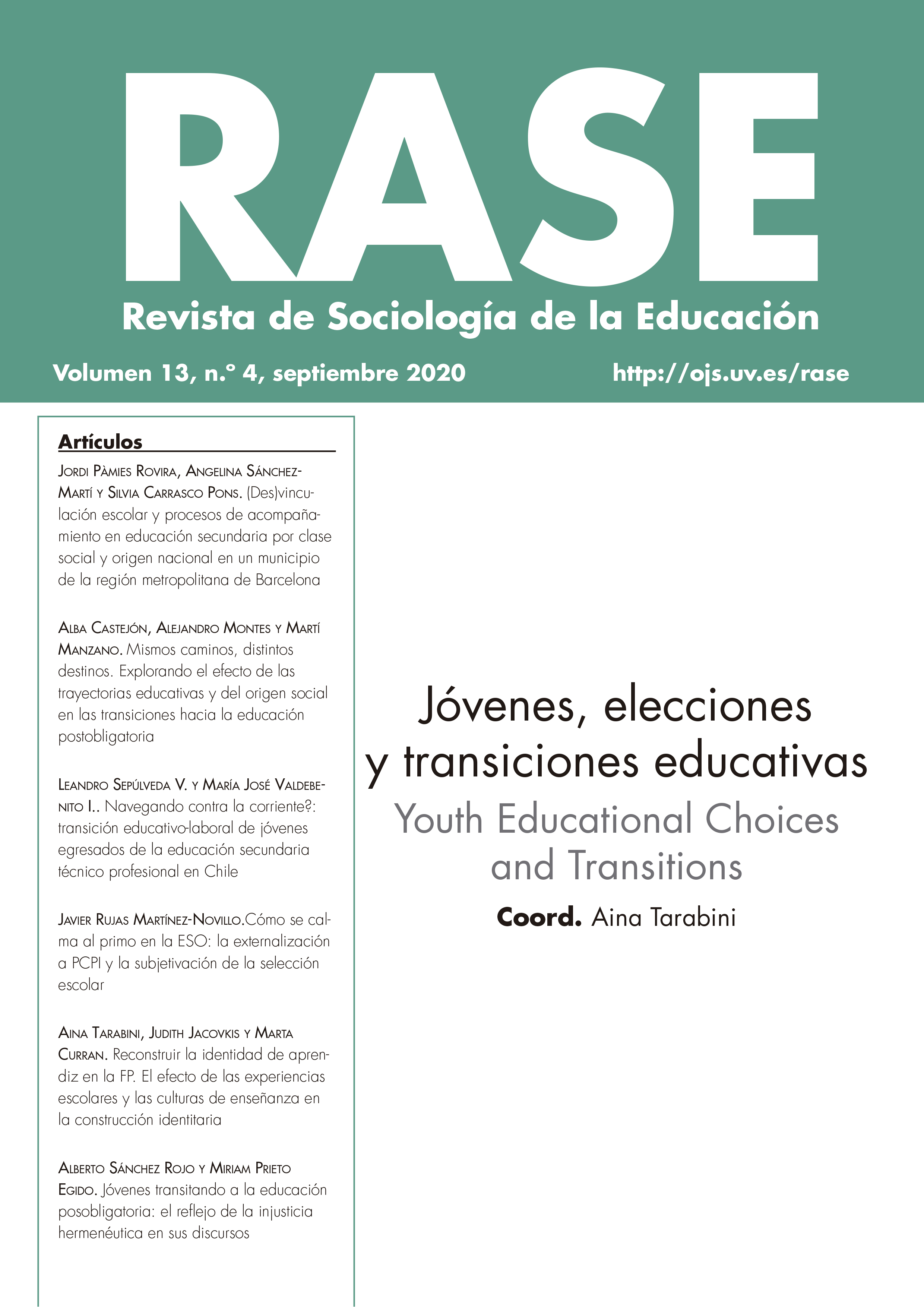Reconstructing Learner Identity in VET. The Effect of School Experiences and Learning Cultures on Identity Construction
DOI:
https://doi.org/10.7203/RASE.13.4.18047Keywords:
Learner identity, school experience, learning cultures, vocational training, educational inequality Abstract
Abstract
Upper Vocational Education in Spain remains as a poorly developed and prestigious training path, despite the significant progress made in recent years. Its levels of supply and demand are much lower than those of the Academic path -the Baccalaureate. In addition, in global terms, VET courses enrol a much higher percentage of working class’ students as well as young people with trajectories of school failure. The objective of this article is to analyse how VET students construct their identity as learners based on their educational experiences – both past and present – and their projections for the future. The analysis develops a qualitative methodology based on 42 in-depth interviews with students in the first course of upper secondary VET in Barcelona. The results show, on the one hand, that the learner identity of VET students is constructed upon on a mostly negative experience of compulsory schooling. This, in turn, is grounded on a public conception of them as bad students. On the other hand, it proves the emergence of processes of identity ressignificance when they enrol in VET, based on the recognition and dignifying of the practical knowledge that articulates the teaching and learning cultures of this training path. In whole, the article contributes to advancing to the study of learner identities as a key element in understanding educational inequalities.
 Downloads
Downloads
 References
References
Archer, Louise y Francis, Becky. (2007). Understanding Minority Ethnic Achievement: Race, Gender, Class and ‘Success’. London: Routledge
Archer, Louise y Yamashita, Hiromi (2003). “Knowing their limits’? Identities, inequalities and inner city school leavers’ post-16 aspirations”. Journal of Education Policy, 18(1): 53–69. DOI: 10.1080/0268093032000042209
Ball, Stephen (1993). “What is policy? Texts, trajectories and toolboxes”. Discourse, 13(2),10–17.
Ball, Stephen, Maguire, Meg y Macrae, Sheila (2000). Choice, pathways and transitions post-16: New youth, new economies in the global city. London: Routledge.
Biggart, Andy y Furlong, Andy (1996). “Educating 'discouraged workers': Cultural diversity in the upper secondary school”. British Journal of Sociology of Education, 17(3), 253-26.
Coll, César y Falsafi, Leili (2010). “Learner identity. An educational and analytical tool”. Revista de Educación, 353: 211-233.
Brockmann, Michaela (2010). “Identity and apprenticeship: the case of English motor vehicle maintenance apprentices”. Journal of Vocational Education and Training, 62(1), 63–73. DOI: 10.1080/13636820903461354
Colley, Hellen, James, David, Diment, Kim y Tedder, Michael (2003). “Learning as becoming in vocational education and training: Class, gender and the role of vocational habitus”. Journal of Vocational Education and Training, 55(4): 471–97. DOI: 10.1080/13636820300200240
Ecclestone, Kathryn (2007a). “Commitment, compliance and comfort zones: The effects of formative assessment on vocational education students’ learning careers”. Assessment in Education, 14(3): 315–33. DOI: 10.1080/09695940701591925
Ecclestone, Kathryn (2007b). “Lost and found in transition: the implications of ‘identity’, ‘agency’ and ‘structure’ for educational goals and practices”. Keynote presentation to Researching Transitions in Lifelong Learning Conference, Univerisity of Stirling, 22-24 June 2007
Ingram, Nicola (2018). Working-Class Boys and Educational Success Teenage Identities, Masculinities and Urban Schooling. Palgrave: London.
Harris, Roger y Rainey, Linda (2012). “Learning pathways between and within vocational and higher education: towards a typology?”. The Australian Association for Research in Education, 39:107–123. DOI: 10.1007/s13384-012-0052-1
Furlong, John Cardiff (1991). “Disafected pupils: Reconstructing the Sociological Perspective”. British Journal of Sociology of Education, 12(3), 293-307.
García Jiménez, Enrique y Lorente García, Rocío. (2015). “Recorrido por la imagen social de la formación profesional: un camino hacia su revalorización”. Revista Española de Educación Comparada, 26: 119-134. DOI: 10.5944/reec.26.2015.14270
Grant, Barbara (2006). “Disciplining students: the construction of student subjectivites”. British Journal of Sociology of Education, 18(1): 101-114. DOI: 10.1080/0142569970180106
Hodkinson, Phil, Biesta, Gert y James, David (2007) “Understanding learning cultures”. Educational Review, 59(4): 415–427. DOI: 10.1080/00131910701619316
Hollingworth, Sumi y Archer, Louise (2010). “Urban schools as urban places: school reputation, children’s identities and engagement with education in London”. Urban Studies, 47 (3), 584–603. DOI: 10.1177/0042098009349774
Jenkins, Ricard (1996). Social Identity. London: Routledge.
Nylud, Mattias y Rosvall, Per-Ake (2016). “A curriculum tailored for workers? Knowledge organization and possible transitions in Swedish VET”. Journal of Curriculum Studies, 48(5): 692-710. DOI: 10.1080/00220272.2016.1138325.
Raffe, David (1992). “Participation of 16-18 year olds in education and training”. National Commission on Education, Briefing Paper, 3. London, National Commission on Education.
Reay, Diane (2010). “Identity Making in Schools and Classrooms”. En Margaret Wetherell y Chandra Mohanty (eds.): The SAGE handbook of identities. London: Sage publications.
Reay, Diane, Davies, Jaqueline, David, Miriam, Ball, Stephen (2001). “Choices of Degree or Degrees of Choice? Class, Race and the Higher Education Choice Process”. Sociology, 35(4): 855–874. DOI: 10.1177/0038038501035004004
Rees, Gareth, Fevre, Ralph, Furlong, John Cardiff, Gorard, Stephen (1997). “History, place and the learning society: towards a sociology of lifetime learning”. Journal of Education Policy, 12(6): 485-497, DOI: 10.1080/0268093970120604
Romito, Marco (2017). “Governing through guidance: an analysis of educational guidance practices in an Italian lower secondary school”. Discourse: Studies in the Cultural Politics of Education, 40(6): 773-788. DOI: 10.1080/01596306.2017.1314251
Willis, Paul (1977). Learning to labour: How working class kids get working class jobs. London: Saxon House.
Valenzuela, Angela (1999). Subtractive schooling: US-Mexican youth and the politics of schooling. Albany: State University of New York Press.
Youdell, Deborah (2003). “Identity traps or how black students fail”. British Journal of Sociology of Education, 24(1): 3–20. DOI: 10.1080/01425690301912
Wheelahan, Leesa. (2007). “How Competency‐based Training Locks the Working Class out of Powerful Knowledge: A Modified Bernsteinian Analysis”. British Journal of Sociology of Education, 28(5: 637–51. DOI: 10.1080/01425690701505540.
Downloads
Published
How to Cite
-
Abstract1448
-
PDF (Español)566
Issue
Section
License
![]()
This work is licensed under a Creative Commons Reconocimiento-NoComercial-CompartirIgual 4.0 Internacional.




